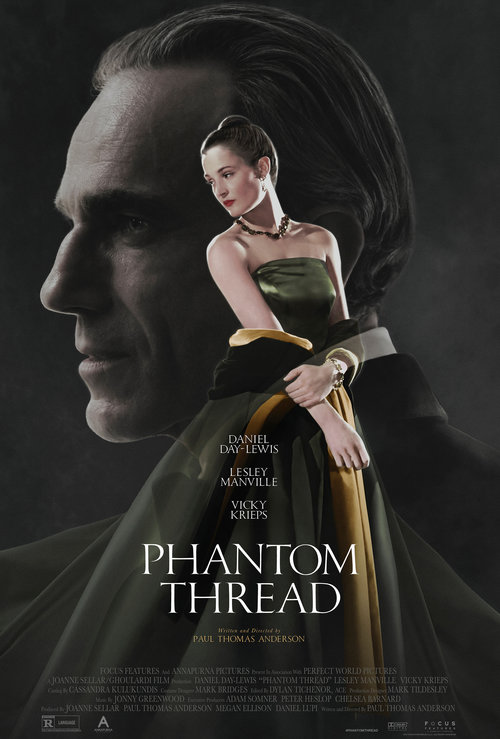SUMMARY
Reynolds Woodcock (Daniel Day-Lewis, “There Will Be Blood”) is a dressmaker whose house is renowned in 1950’s London. An auteur, eccentric, and man of particularity, Reynolds is taken with young Alma (Vicky Krieps) whose admiration of his craft and person are inexhaustible. As their relationship is strained by eccentricity, artistic striving, and personal dissimilarities, the couple is pressed to make the most difficult decisions and commitments of their lives.
MY THOUGHTS
I am not of that school which believes that Paul Thomas Anderson (PTA) does no wrong. His oeuvre is full of movies I find sublime (a word I reserve for only the best films) and films which I find boring and inscrutable. I have seen approximately half of them, and while I am inclined to watch them all at some point, they are among those movies that get pushed further and further back into the queue by whatever pressing works are being currently released.
I regard “There Will Be Blood” among one of the truly great modern classics and am usually intrigued when his films appear, knowing they will be of a caliber only matched by the finest directors, telling stories the likes of which are seldom told.
As such, I was looking forward to “Phantom Thread” perhaps more that any other film of the year, save “Shape of Water.” In “Phantom Thread,” all of these expectations were met in such a pleasantly satisfying way.
Of course, the most notable thing about this film at first is the acting. Day-Lewis and Krieps give portrayals of characters whose complexities are intriguing and tantalizing. This is a film which mainly consists of conversations and glances held across rooms, breakfast tables, and sewing stations, and yet, never did I feel bored. Reynolds and Alma were people I did not so much feel endeared to as fascinated by. Watching them watch each other, work together, and grasp after each other’s affections was like parsing poetry for its secret subtext.
THEME
Saying this film has a plot is like saying a marriage has a plot. There are, of course, events that transpire but the thing you are watching here is the unfolding of a relationship. What matters in the world of this film is not the events attended, the dresses made, or the kisses given, but the feelings that attend every action, glance, or tea.
The theme which emerges over the course of the film is one seldom seen in movies today. In a media culture obsessed with hormonal passion firing bursts of excitement across every screen there is little time for the slow long sacrifice of a relationship built upon love, respect, and common ground. The expression it finds is peculiar to say the least, in this film, but ultimately each (Alma and Reynolds) find that they are willing to endure tremendous hardship for the other’s sake and thus, both, unwilling to abandon the other or succumb ultimately to self absorption.
SCORE
A relationship, strong to weather storms, is an ancient story told with such delicate ingenuity that one may easily miss either its ancient roots or its fresh vision of that theme. Similarly, “Phantom Thread’s” score is stunning in its classical overtones which obfuscate its thoroughly modern face. As I watched the film I found myself thinking I would have to look up what this piece of music was, convinced that it was some bit of classical music I had simply not heard before, or at the least, of which I had not learned the name. To find upon searching that it was a wholly original score and composed by lead guitarist of Radiohead, Jonny Greenwood, was surprising to say the least. It is a score which lives in and beyond the film. While many scores may transport me to a place as I watch, few seem to inhabit the film as this one does.
I am reasonably certain that I could visit Dunkirk and be moved by the sacrifice made there, or stand outside of Churchill’s chambers and reflect upon the words he would dictate and address a nation with, but if I were to spend an afternoon in the sitting room of Reynolds Woodcock, i think I would hear Jonny Greenwood’s score in my mind.
WEAKNESSES
I hesitate to call the pacing of this movie a weakness as I find its deliberation an essential aspect of the film and one of the things I enjoyed about it but I do at the same time understand why some would find it dull. I would say the same is true of the cinematography. Visually it is a quiet film of stillness, and so the camera seldom moves. This minimalism was a breath of fresh air in my opinion but again, might seem dull to some.
Rather than calling them true weaknesses, I would simply caution those who see it to prepare for a quiet evening rather than a boisterous one and hope that they are able to tune their expectations.
VERDICT
Can you tell I loved this film? I truly did. I’d watch it again this second. Though I do not think it will win many Academy Awards as so many of its principle players have won them before but when a movie won’t win much because it’s actor and director/writer have won so many, perhaps the film itself can be enough.
Review Written By:





